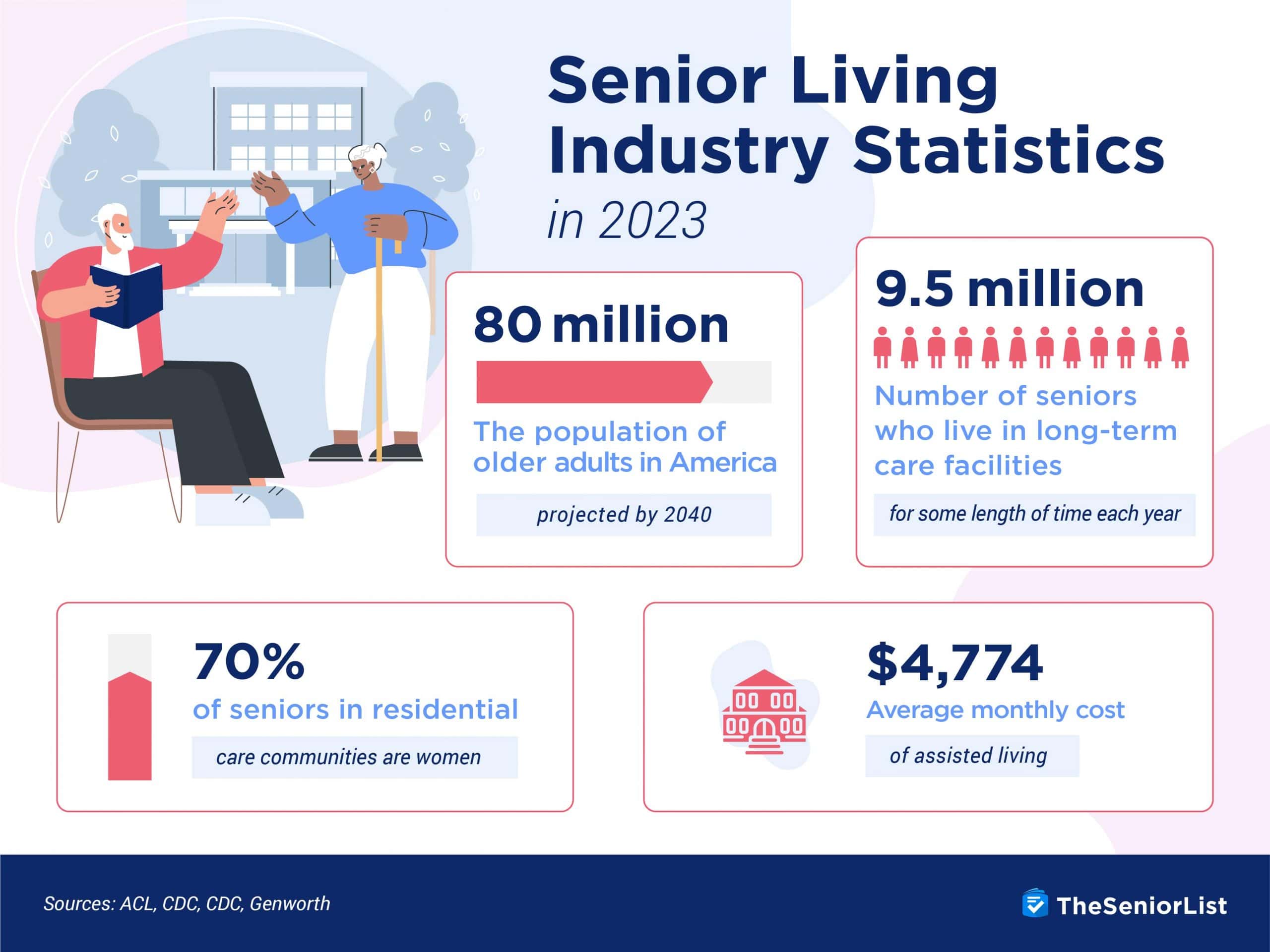Condos for Seniors: Retirement and 55+ Condo Communities
Senior condominium communities are living arrangements that require residents to be at least 55 years old. These communities offer more independence than assisted living facilities and often feature gyms, swimming pools, libraries, salons, and social activities.
If you’re sick of keeping up with pesky lawn or plumbing issues, then a senior condo might be right for you. Just remember that, like purchasing a traditional condo, this living arrangement comes with steep up-front costs.
Pros and Cons of Living in a Senior Condo
Pros
- Amenities: Senior condos provide exterior maintenance, social programming, wellness opportunities, and assistance so you can make the most out of your golden years.
- Affordability: Senior condos provide maintenance and upkeep services that make it a more affordable option than a regular home. Additionally, they often cost less than comparable non-senior apartments.
- Social network: Since everybody in senior living communities is over 55, it’s a great place to meet people and form long-lasting friendships.
Cons
- No medical assistance: Senior condos rarely offer medical assistance. If you or your loved one need help with medication administration or other skilled treatments, you’ll want to look elsewhere.
Senior Condo Options
Within the realm of senior condos, there are several different types of communities. Each of them offers different costs, services, and amenities.
Retirement Condos
A retirement condo (sometimes called a retirement community) is a community or complex for people over 55. These are condominiums or houses that individuals rent or purchase with a homeowners association (HOA) fee that offers additional amenities for older adults.
These communities typically manage exterior maintenance and yard upkeep so you can stop mowing the lawn and focus on enjoying yourself! Many of these communities offer enhanced security, health facilities, gyms, and opportunities to socialize with other residents.
Some communities even have movie theaters, restaurants, and art studios for residents to indulge in their passions. This is important as studies show that indulging in the arts leads to healthy aging outcomes, including improved cognitive function, memory, and overall well-being. Retirement condos are perfect for active adults looking to kick back and enjoy their golden years.
Assisted Living Condos
Assisted living condos allow older adults to live in a private space with access to some assistance and health care. Assisted living differs from a nursing home in that medical professionals and other personnel help with medication management, mobility, personal care, dressing, and housekeeping but do not provide around-the-clock health care.
Assisted living communities typically feature a dining room offering breakfast, lunch, and dinner. Like retirement communities, these living arrangements often have a social and wellness calendar to keep you stimulated and healthy. Many of these activities include group outings to shopping malls, movies, and plays to get you out of the house. Assisted living arrangements are perfect for those who would like to live independently with a robust social network, but still need some help caring for themselves.
FYI: To learn more about assisted living, read our guide to assisted living costs.
Senior Apartments
Senior apartments have similar amenities and services as a senior condominium community, except that they are only available on a rental basis. Apartments are located in the same building, or a complex of buildings, often with a communal area for meals or recreation. These apartment complexes are age-restricted, offer a more limited calendar of social activities, and services like on-site laundry.
Since these are rentals, residents do not have to worry about indoor or outdoor maintenance. If the toilet breaks, you can typically call an on-site repairman to fix it as a part of your rental agreement. Senior apartments are perfect for those who like the community of senior living but require an affordable living situation.
Adult Care Homes
Adult care homes are residential houses that are licensed to care for a small community of older adults (typically 6 to 12). These homes provide meals and medical care for residents. Depending on the adult family home, these residences may offer basic services (medication management, mobility help, housekeeping, and cooking) or elevated care for those with more serious health conditions. Adult family homes have a greater level of care because of the limited number of occupants but they can be pricier than other options.
Should You Rent or Buy a Senior Condo?
Obviously you need to decide whether you want to purchase or rent a senior condo before you move. The level of care you need, amenities offered, and location all factor into the cost of your new home or rental.
| Renting a Senior Condo | Buying a Senior Condo |
|---|---|
|
|
Renting a Senior Condo
Renting a condo is an affordable and flexible option. One big perk is the availability of medical care if you need it. Many of these options have staff that can help with medication, mobility, and other essential daily tasks if you need it. In addition, most senior condo arrangements have a wing for more advanced care so you can move into another unit if your medical needs change over time. Senior condo rentals also offer flexibility and affordability that purchasing a home does not. This option is good for seniors on a budget who want more flexibility in their living situation.
Pro Tip: There are low-income apartments available for seniors. These government-subsidized apartments can be rented for a low price and are perfect for seniors on a tight budget.
Pros
- Affordable: Renting is often less expensive than buying a home. Individuals simply sign a lease, pay a security deposit and community fee along with a monthly rental payment. Oftentimes, utilities are covered in the monthly rental fee as well so you don’t have to worry about keeping up with multiple bills.
- Medical care: Basic medical care and assistance is often part of the monthly rental payment. Communities often offer differing levels of care so if your health changes and you need a higher level of medical care, the rental complex can accommodate you.
- Flexibility: If you can no longer afford rental fees, you can move out easily and find another living situation.
- Services and amenities: Rental communities offer services and amenities like housekeeping, maintenance, and event programming built into the monthly rental payment so you have access to these perks without having to pay for them on an ad hoc basis.
- Liquidity: Mortgages and house costs can be cumbersome. Renting frees up cash so you can invest or keep a nest egg for vacations, gifts, or inheritances.
Cons
- Rent increases: Landlords may increase your rental payments periodically which can make financial planning difficult in the long term.
- No equity: Owning a home can be a lucrative investment. Rentals often do not allow you to remodel or make changes to your living space and cannot be sold at the end of a lease for cash.
Buying a Senior Condo
Purchasing a senior condo may be a good option, especially if you’re looking to downsize while also accessing the amenities of a senior living community. Unless you buy it outright, you will be responsible for paying the mortgage. Senior condos also come with homeowners association fees and property taxes, which vary state to state. Individuals are also responsible for basic utilities (water, garbage, electricity, internet, etc.) payments.
Purchasing a condo is good for active individuals looking to settle down for the long haul and build equity. Home ownership can buttress your finances and leave a nice inheritance for your loved ones, but it does come with more responsibilities.
Pros
- Builds Equity: Costs may be higher with mortgages, taxes, and HOA fees factored in, but homeowning builds wealth so you may receive a financial windfall if you decide to sell.
- Stability: Owning a home means more control over your financial obligations. There is no landlord to increase rent and you can always refinance your mortgage if need be. There are also tax benefits to ownership that can lower living costs.
- More space: A home is often bigger than an apartment so if you’re looking for more space for guests, purchasing a home is a good option.
- Customizable: If you don’t like your kitchen, you can remodel! Owning a home allows you to make improvements and alter your home which often increases the value. Additionally, if the need arises, you can modify your home to accommodate a wheelchair or mobility scooter.
Cons
- No medical care: While retirement communities often have a health care and wellness center, they don’t offer advanced assistance or supervision. If you purchase a home and require this assistance later on, it would be an additional cost that you are responsible for that’s separate from the HOA fee.
- Less flexibility: If you decide to move, you will have to put the house up for sale and secure a buyer, which can sometimes be a lengthy process depending on the economy. Additionally, you may lose money if the home value goes down.
Senior Living Communities vs. Condos
Senior living communities have condominiums or homes for sale as well as for rent. Whether you decide to rent or buy, you still have access to all the amenities the community offers.
If you purchase a condo, amenities are paid for through homeowners association fees in addition to your mortgage payment (if you have one). Exterior maintenance is provided through your homeowners association. You are responsible for interior maintenance or remodels. If you want to leave the community, you will need to put the condo up for sale and find a buyer in order to move.
You still have access to community amenities if you rent a condo; they are just consolidated into the monthly rental payment as opposed to a separate HOA fee. A big perk with renting is the flexibility to leave when the lease is up, along with the ability to access comprehensive medical care if you need to down the line. If you purchase a condo, you would be responsible for paying for in-home care as opposed to simply moving to another unit with a monthly fee that covers medical assistance.
How to Find a Senior Condo
Each city or area has options for senior living. Individuals can work through a realtor to find a rental or unit in a community that fits their needs. You can also find a listing of apartments online or in the newspaper. The listings for these condos typically list the age restrictions and the amenities for senior living.
Pro Tip: Check out our list of best assisted living facilities to get started on house hunting.
Senior living communities often allow you to tour the property or even stay a few days to determine if the condo is a fit. It may be helpful to bring a caregiver or loved one along to get a second opinion. Each community has different restrictions and services so be sure to read all the fine print on a lease before signing one.
To learn more about senior living communities, be sure to check out our helpful guides:
Senior Condo Frequently Asked Questions
-
What is a senior condo?
A senior condo is a home in a community specifically for older adults. These communities often offer specialized wellness and social programming, as well as services such as grounds upkeep, housekeeping and more, depending on the community.
-
Is it cheaper to live in a 55+ community?
55+ communities often cost less than similar communities with no age restrictions. Senior living communities with more amenities are typically more expensive. Low-cost options are available but they may have fewer perks.
-
Is 55+ housing a good investment?
Purchasing a home is typically a good, safe investment. It allows you to build equity and provide an inheritance. Depending on the economy, you can make a profit on the home if you decide to sell.
-
Can I live with my grandma in a 55+ community?
Most 55+ communities allow for younger people to live with older adults as long as one person living there is over 55 years old. Most retirement communities are legally required to have 80 percent of its residents be over 55, so it depends on the demographics of the particular community you live in.
-
Are senior condos cheaper?
Senior condos are usually cheaper than regular apartments or homes. Senior living communities offer amenities that regular homes or condos do not, which can save money on maintenance expenses and medical care in the long run. Some apartments are subsidized by the government as well so the cost of living is lower.







